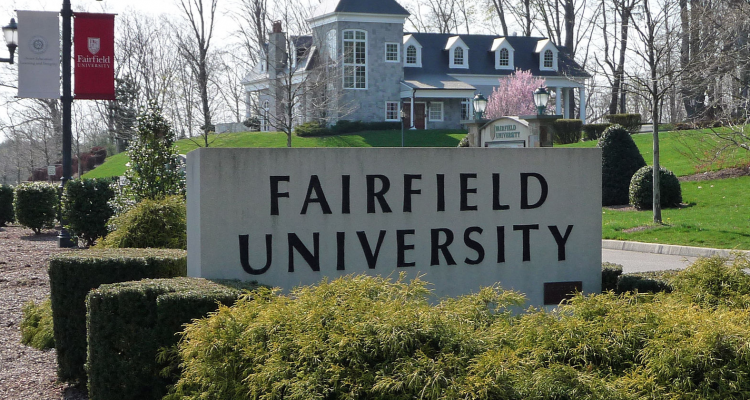Last week, The Mirror reported that the lack of COVID-19 data posted to the COVID-19 dashboard caused many students to call for more transparency from the administration regarding decision-making processes. Since then, the COVID-19 dashboard has been updated.
The University stated that the repopulation testing that occurred from Jan. 1 – Jan.31 resulted in a 9% positivity rate.
They do not state how many community members were tested to reach this rate, nor did they address if they were including students that tested negative multiple times. If we use Fairfield University’s Campus Community statistic from the dashboard, of 6,910, that would be roughly 622 positive cases if everyone was tested. But, since students who had tested positive for COVID-19 within 90 days of the Jan. 1 – Jan. 31 window did not have to test, the reported population would be lower.
The University has also changed the COVID dashboard to include a “Current Testing Data” section, but they do not state how current these numbers are, nor do they indicate how often this section is updated. They do state that they will begin a “7-Day Rolling Average” on Feb. 11.
If students want more information for how the administration is deciding COVID-19 protocols or testing, then typically they could access the Academic Council or Undergraduate Curriculum Committee’s meeting minutes for information updating the faculty on cases, mitigation strategies and general COVID-19 updates.
But, according to the Secretary of the General Faculty, Steven Bayne, Ph.D., in February of 2021, the Office of the Provost requested that the Academic Council pass a motion that made the meeting minutes password protected in an effort to restrict access to the Fairfield University Community exclusively.
Bayne and the previous Secretary of the General Faculty, Susan Rakowitz, Ph.D. began to work with Information Technology Services in May of 2021 to put this motion into action.
Bayne stated, “The plan was to password protect files with meeting minutes in them so that all members of the Fairfield University community (including students) could access them using their NetID.”
They worked with a company called DocFinity, but after issues on DocFinity’s part, the work stalled.
He added that “Last week, ITS, apparently under pressure from the President and Provost, decided they could wait no longer to protect these files, and so they chose to go with a temporary solution using Dropbox on the most recent files and limiting access completely on previous years’ minutes files.”
Bayne later learned that the University’s use of DropBox barred students from accessing the meeting minutes, and states that if students want access to the files, they have to contact him to file a request.
Provost Christine Siegal Ph.D. did not mention that the Provost’s Office originally requested the motion be passed by the AC in February of 2021.
“During the spring 2021 semester, the Academic Council passed a motion stating that ‘Links on the General Faculty website be password protected and that access be restricted to members of the Fairfield University community,’” she stated, continuing that ITS has been working with the General Faculty Secretary to implement the motion.
She does not state that the switch to DropBox this week was due to the Provost and President’s request as Bayne stated, but instead says that the new password protection was part of the “implementation process.”
Seigel adds, “The General Faculty Secretary is continuing to work with ITS to ensure that password protected access is available to members of the University community, as per the motion.”
She ends by stating, “In the meantime, there are student representatives on both the Academic Council and the Undergraduate Curriculum Committee who have access to the meeting materials.”
The two student representatives in the committees are the Fairfield University Student Association President Tyler Heffern ‘22 and FUSA Senator Vincent Rotondo ‘23.
Heffern sits on the AC and was notified of the issues with student access before their meeting on Feb. 7 and brought up the concerns with the General Faculty and the Executive Secretary of the AC.
He continued that, “A discussion ensued in the meeting about transparency and all of the speakers agreed that students should have access to minutes and agendas of the meetings though [they] could not settle on how to do that or how long it would take to fix the problem on their online platform.”
Heffern added that Siegel mentioned in the meeting that while ITS works, student representatives could provide the documents to students who wanted them.
“However, even as the student representative on the Council, I did not have access to the meeting’s agenda packet or their Zoom link and had to specially request them from their leadership,” Heffern stated, adding, “I also found it rather shocking that the administrative voice on the AC would make it my responsibility to keep the executive arm of the faculty transparent.”
Heffern added that he doesn’t believe a request for documents “…should ever be necessary” and “As members of the Fairfield community, students should have unrestricted access to documents by those who govern our institution just as administrators and faculty have access to student government documents.”
Rotondo added that, “At this time, I don’t believe there are set plans to make the UCC Minutes more accessible to students; however, I do believe that there is certainly a necessity for them to be.”
Rotondo continued, “The student body deserves to hear about what is going on academically at our institution.”
The Mirror will update on this story as more information becomes available.


Leave a Reply